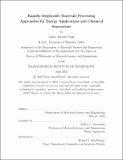Rapidly-Deployable Materials Processing Approaches for Energy Applications and Chemical Separations
Author(s)
Patil, Jatin Jayesh
DownloadThesis PDF (78.70Mb)
Advisor
Grossman, Jeffrey C.
Terms of use
Metadata
Show full item recordAbstract
Anthropogenic CO₂ emissions can be mitigated through a combination of deploying and improving methods to generate, store, and save energy worldwide. These methods rely on materials advancements, but due to the short timescales available to actually implement solutions, will require rapid deployment that should leverage existing infrastructure to make a timely and sizeable impact. My thesis focuses on a few case studies of materials systems relevant to solar energy and chemical separations to improve their performance using existing and rapidly-deployable systems. I first present and analyse the case of the instability of metal nanowire networks, where my work investigates and demonstrates design principles for encapsulants which are economically viable and deployable with widely-available vapor deposition equipment. Next, I investigate the relative advantage of carbonaceous membranes for chemical separations and electrochemical applications by exploring the properties of graphene oxide membranes. We examine coal tar pitch-derived graphene oxide to understand means of improving the permeance and chemical stability of graphene oxide membranes without reducing their nanofiltration capacity. Furthermore, I investigate laser annealing with a CO₂ laser cutter as a means to modify membrane materials to make them conductive for electrochemical applications such as redox-flow batteries and dye degradation. Finally, the thesis concludes with an outlook for future work, where I discuss the implications of rapidly-deployable processing innovation, in addition to
how it can contribute to waste valorization and a circular economy.
Date issued
2023-06Department
Massachusetts Institute of Technology. Department of Materials Science and EngineeringPublisher
Massachusetts Institute of Technology